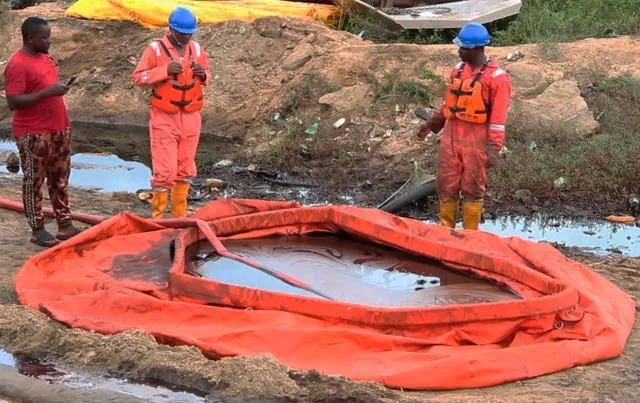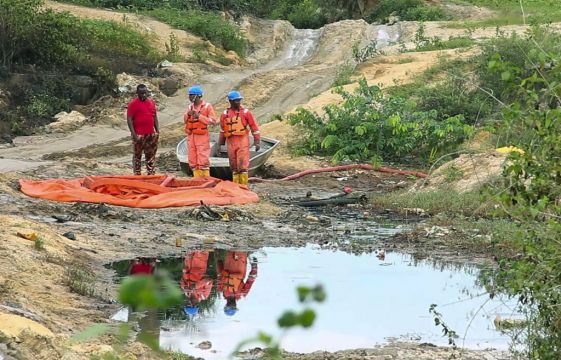A new oil spill at a Shell facility in Nigeria has contaminated farmland and a river, upending livelihoods in fishing and farming communities in part of the Niger Delta.
The region has long endured environmental pollution caused by the oil industry.
The country’s National Oil Spill Detection and Response Agency (Nosdra) said the spill came from the Trans-Niger Pipeline operated by Shell that crosses through communities in the Eleme area of Ogoniland, a region where the London-based energy giant has faced long-standing local resistance to its oil exploration activities.
The volume of oil spilled has not been determined, but activists have published images of polluted farmland, water surfaces blighted by oil sheens and dead fish mired in sticky crude.
While spills are frequent in the region due to vandalism from oil thieves and a lack of maintenance to pipelines, according to the UN Environmental Programme, activists have described the spill as a “major” incident.

Fyneface Dumnamene, an environmental activist whose non-profit Youths and Environmental Advocacy Centre monitors spills in the Delta region, said the spill which began on June 11 is “one of the worst in the last 16 years in Ogoniland”.
He added: “It lasted for over a week, burst into Okulu River — which adjoins other rivers and ultimately empties into the Atlantic Ocean — and affected several communities and displaced more than 300 fishers.”
Mr Dumnamene said tides have sent oil sheens about six miles further to creeks near the nation’s oil business capital, Port Harcourt.
Shell stopped production in Ogoniland more than 20 years ago amid deadly unrest from residents protesting against environmental damage, but the Trans-Niger Pipeline still sends crude from oil fields in other areas through the region’s communities to export terminals.
Nosdra director general Idris Musa said the leak has been contained, but treating the fallout from the spill at farms and the Okulu River, which runs through communities, has stalled.
“Response has been delayed,” Mr Musa added, blaming protesting residents. “But engagement is going on.”
The apparent deadlock stems from mistrust and past grievances in the riverine and oil-abundant Niger Delta region, which is mostly home to minority ethnic groups who accuse the Nigerian government of marginalisation.
Africa’s largest economy overwhelmingly depends on the Niger Delta’s oil resources for its earnings, but pollution from that production has denied residents access to clean water, hurt farming and fishing, and heightened the risk of violence, activists said.
Mr Dumnamene said the communities “are very angry because of the destruction of their livelihoods resulting from the obsoleteness of Shell’s equipment and are concerned the regulator and Shell will blame sabotage by the residents”.

Oil companies often blame pipeline vandalism by oil thieves or aggrieved young people in affected communities for spills, which could allow the firms to avoid liability.
Shell said it is working with a joint investigatory team, consisting of regulators, Ogoniland residents and local authorities, to identify the cause and impact of the spill.
The firm’s response team “has been activated, subject to safety requirements, to mobilise to the site to take actions that may be necessary for the safety of environment, people and equipment”, a company statement said.
Nosdra confirmed the joint investigation, but a cause of the spill – whether sabotage or equipment failure – has not yet been revealed.
Mr Dumnamene said hundreds of farmers and fishermen who have been cut off from their livelihoods would insist on restoration of the environment and then compensation.
At the request of the Nigerian government, the UN Environment Programme conducted an independent environmental assessment of Ogoniland, releasing a report in 2011 that criticised Shell and the Nigerian government for 50 years of pollution and recommended a comprehensive, billion-dollar clean-up.
While the government announced the clean-up in 2016, there is little evidence of restoration on the ground. The government says community protests and lawsuits by local activists have hampered progress.
Ledum Mitee, a veteran Ogoni environmental activist and former president of the Movement for the Survival of Ogoni People, said: “A credible clean-up would have been a beacon of hope for the Niger Delta and other areas in Africa that have suffered oil pollution, but no credible clean-up is ongoing.
“It is a cover-up, and we do not see the impact.”







